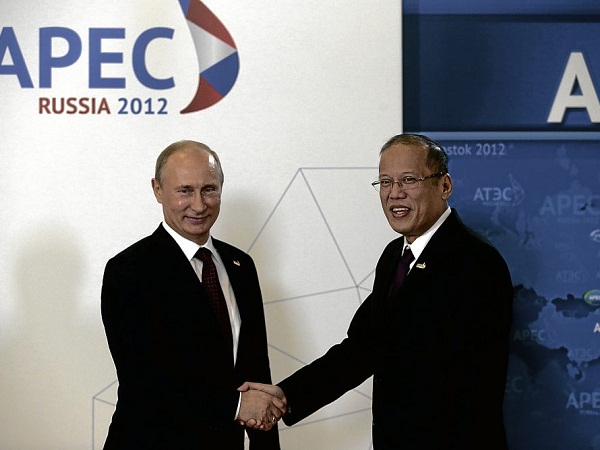Asia-Pacific leaders urged to build bridges, not walls

APEC HOST Russian President Vladimir Putin greets President Aquino at the 20th Asia-Pacific Economic Cooperation summit in Vladivostok on Saturday. AP
VLADIVOSTOK—Asia-Pacific leaders on Saturday called for unity in tackling a raft of economic challenges, as the summit began here amid deep divisions over worsening territorial disputes and other rows.
Russian President Vladimir Putin, host of the 20th Asia-Pacific Economic Cooperation (Apec) forum and leaders’ summit, opened the two-day gathering with a call for a renewed joint commitment to open up regional trade.
“By getting together and lifting barriers, we encourage dynamic development of the entire Asia-Pacific region and the global economy in general. It is important to build bridges, not walls,” Putin told his fellow leaders.
The 21 members of Apec, which accounts for nearly half of world trade, meet every year to build goodwill in their effort to break down trade barriers, with the bloc’s rules decided by consensus.
But this year’s summit began with Apec giants China, Japan and South Korea embroiled in various territorial disputes that have fanned intense nationalist flames, and with US-China relations also heating up over the West Philippine Sea.
Japanese Prime Minister Yoshihiko Noda said he would not hold customary bilateral summit talks with China’s President Hu Jintao nor South Korea’s Lee Myung-Bak because of Japan’s separate territorial disputes with their nations.
Besides the Philippines, Apec member Vietnam has also spoken out strongly against China in the lead-up to the summit.
The Philippines and Vietnam have accused China of a campaign of intimidation to enforce its claims to virtually all of the West Philippine Sea, parts of which they contest.
Speaking at a presummit business forum earlier Saturday, Hu called for all countries to ensure the tensions did not escalate into more serious conflicts.
“To maintain peace and stability as well as sound momentum of economic growth in the Asia Pacific is in the interest of all countries in the region. It is our shared responsibility,” Hu said, while also warning against protectionism.
Trade barriers
Philippine economic officials went into the forum worried that more countries would put up more barriers to trade as world economic growth cools down.
“There were statements during the ministerial discussions that there’s increasing protectionism,” Philippine Trade and Industry Secretary Gregory Domingo told a news conference on Saturday. “So the ministers said that this is something that member states should really try to avoid doing.”
Socioeconomic Planning Secretary Arsenio Balisacan said the Philippines and other Apec members wanted to make sure their partners would not take a protectionist stand in the wake of the euro crisis and the slowdown in big economies like China.
“We are espousing the position that we need to solve the problems that are facing our domestic economies in a way that we will not curtail the expansion of trade,” Balisacan said.
In a joint statement issued after their two-day meeting, the Apec trade ministers said: “We noted with concern the International Monetary Fund’s downward projection for global growth for this and next year and the rise in protectionist instances around the world. These developments increase the urgency of further action to keep markets down.”
US interests
The United States has riled China by calling for a code of conduct for the West Philippine Sea and insisting on freedom of navigation in the strategic waterway. China has also perceived a greater US focus on Asia as an effort to contain it.
US Secretary of State Hillary Clinton, standing in for US President Barack Obama, said Thursday on a presummit swing through the region that Washington was not going to shy away from standing up for American strategic interests.
She emphasized at a business forum on the sidelines of the summit on Saturday that the United States was determined to increase its economic and political footprint in the region.
“After an extended period in which the United States had to focus a great deal of attention and resources on regions and conflicts elsewhere, we are now making substantially increased investments in the Asia Pacific,” she said.
“We seek to work with others to build a stable and just regional order that will benefit everyone,” she said.
Apec leaders have insisted they will still make progress in Vladivostok in opening up economies.
Leaders’ statement
They will jointly call for greater efforts to “support growth and foster financial stability and restore confidence,” according to a draft of a leaders’ statement to be released at the end of the summit and obtained by AFP.
It warns of mounting risks to the region from eurozone crisis in Europe and pledges to work to stoke domestic demand to counter falling exports.
The assembled leaders are also expected to approve a deal reached on Thursday by their trade ministers to cut tariffs on a list of dozens of “green” products in the Asia-Pacific region to boost trade in the goods and help protect the environment. Reports from Gil Cabacungan and AFP
For comprehensive coverage, in-depth analysis, visit our special page for West Philippine Sea updates. Stay informed with articles, videos, and expert opinions.